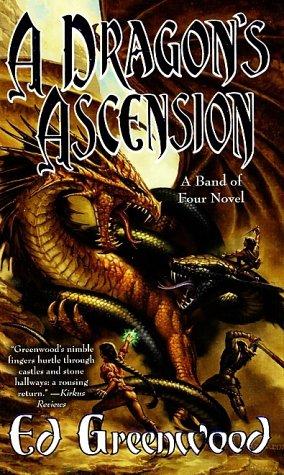
A Dragon's Ascension PDF
Preview A Dragon's Ascension
The creator of the Dungeons & Dragons based Forgotten Realms series (Elminster, etc.) offers conventional heroic fantasy fare in this third and probably final volume in the Band of Four series. The warrior Hawkril, the thief Craer, the healer-wizard Sarasper and the sorceress Lady Embra Silvertree continue to entertain as well-drawn, if sometimes slightly tongue-in-cheek, archetypes. They have their work cut out for them when they discover that giving the kingless land of Aglirta a "Risen King" has not quashed ambitious barons who desire the throne for themselves, enemies who want vengeance on the Four personally, or the scheming, literally scaly priests who wish to bring back the Serpent and rule or ruin the world. As the stakes rise, the Four rapidly lose their sense of humor and the action becomes genuinely gripping, as well as fast and bloody. The cast of characters at the back is essential to avoid confusion, even if one has read the two previous books, The Kingless Land (2000) and The Vacant Throne (2001). After the fall of Flowfoam Castle and the confrontation between the Dragon and the Serpent, not everybody the reader has come to care for is left standing, while the role of the shape-changing Koglaur as deus ex machina remains a puzzle. Game-oriented fantasy fans and new converts to the genre through the film The Lord of the Rings: The Fellowship of the Ring should be satisfied, but those hoping to find another Terry Pratchett would do best to seek elsewhere. (Mar.
Copyright 2002 Cahners Business Information, Inc.
FromThe title of the third volume of the Band of Four saga refers to the advance and near-triumph of the servants of the Serpent. In addition to those, the formerly kingless land of Aglirta now faces usurpation and tyranny at the hands of a powerful warlord, whose challenge divides resistance to the minions of the Serpent at the worst possible time. Enter the Band of Four--Hawkril the warrior, Craer the thief, Sarasper the healer, and Lady Embra Silvertree the sorceress--to oppose Serpent and warlord, highly if not unexpectedly successfully. Yet the end of this book leaves room for further volumes by Greenwood, whose previous work has included plenty of game-related fiction. The originality and wit he displayed in that work is even more evident in this saga, and indeed there is little that is generic about any aspect of either this book or the series of which it is a part. Roland Green
Copyright © American Library Association. All rights reserved
